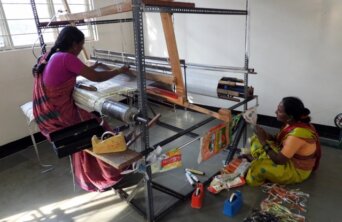- About
- Topics
- Picks
- Audio
- Story
- In-Depth
- Opinion
- News
- Donate
- Signup for our newsletterOur Editors' Best Picks.Send
Read, Debate: Engage.
| topic: | Sustainable Consumption |
|---|---|
| located: | India |
| editor: | Bindu Gopal Rao |
What would you do with a packet of instant noodles after using it? More often than not, they are tossed into the bin.
What if these could be collected, processed, and converted into something useful? This happens in India at a small facility called Sakhi at Vijaynagar in Bellary, which primarily employs women from the local community.
The unique upcycling process uses a traditional charkha or spinning wheel and handloom to weave fabric from all the waste plastic gathered.
The entire process is manual and has helped create livelihood opportunities for local communities and revive India's traditional weaving heritage.
The company ethically sources plastic waste from organisations working with the waste-picking community, a marginalised group in India that largely works in the unorganised sector. Collecting waste from them gives them a source of livelihood. The plastic is also collected door to door from surrounding villages and is also donated. Raghavendra, a manager at the facility, explains that 60 women from surrounding villages work here, and each team that has four women produces 7.5 meters of fabric from scratch daily.
All the material is handpicked, cleaned, sorted by colour, sanitised, and sun-dried. Then, it is manually cut into strips, rolled on a traditional charkha, and woven with cotton thread on the handlooms into coordinated running material. The running material makes various well-designed products like bags, pouches, diary covers and planters. This centre works to create products branded by Ecokaari, a social enterprise.
A team of female tailors carries out the final stage of stitching. After production, all items undergo a thorough quality check. This includes a physical inspection to ensure appropriate stitching and no defects.
This project provides a sustainable solution to the often-ignored yet growing problem of single-use plastic waste through an innovative, socially conscious, green upcycling process in India. "Our aim has always been to provide a meaningful livelihood for the people in our vicinity and contribute sustainably towards the earth," says Sangita Jindal, the founder of the JSW Foundation, the social development arm of the US$ 23 billion JSW Group, one of India’s leading business houses.
This initiative also helps individuals from humble backgrounds as it aims to bring meaningful positive change through empowerment programs for people not belonging to the weaving community to learn and acquire new skills. As an initiative that combines sustainability and livelihood, this is a great example of making a difference in more ways than one.
Image by Bindu Gopal Rao.

